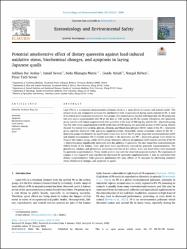Potential ameliorative effect of dietary quercetin against lead-induced oxidative stress, biochemical changes, and apoptosis in laying Japanese quails

Göster/
Erişim
info:eu-repo/semantics/openAccessTarih
2022Yazar
Arslan, Aslıhan SurSeven, İsmail
Mutlu, Seda İflazoğlu
Arkalı, Gözde
Birben, Nurgül
Seven, Pınar Tatlı
Üst veri
Tüm öğe kaydını gösterÖzet
Lead (Pb) is a widespread environmental pollutant which is a toxic threat to human and animal health. The present study was designed to evaluate the ameliorative role of quercetin in laying quails exposed to Pb. A total of 112 birds were randomly divided into four groups. The control group was fed with basal diet, the Pb group was fed with ration supplemented with Pb at the dose of 100 mg/kg (as Pb (II) acetate trihydrate), the Quercetin group was fed with ration supplemented with quercetin at the dose of 400 mg/kg, and the Pb+ Quercetin group was fed with ration supplemented with Pb at the dose of 100 mg/kg and quercetin at dose of 400 mg/kg. Results showed that serum total protein, glucose, albumin, and blood urea nitrogen (BUN) values of the Pb + Quercetin group partially improved with quercetin supplementation. Meanwhile, serum creatinine values of the Pb + Quercetin group was found to be significantly lower than that of the Pb group. Aspartate aminotransferase (AST) and alanine transaminase (ALT) enzyme activities in the Quercetin and Pb + Quercetin groups were similar to those of the Control group, unlike the Pb group. Moreover, alkaline phosphatase (ALP) enzyme activity of the Pb + Quercetin group significantly improved with the addition of quercetin. We also found that malondialdehyde (MDA) levels of the kidney, liver, and heart were significantly reduced by quercetin supplementation. The glutathione, catalase, and glutathione peroxidase activities of the kidney, liver, and heart tissue were increased by quercetin supplementation. These results were in line with the observed apoptotic markers. The expression of caspase-3 and caspase-9 were significantly decreased by quercetin supplementation. It may be concluded that dietary supplementation with quercetin ameliorates the toxic effects of Pb exposure by alleviating oxidative stress, biochemical changes, and apoptosis in quails.

















